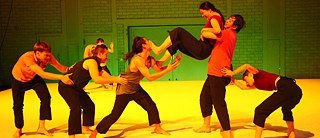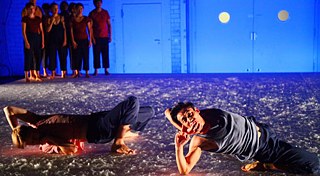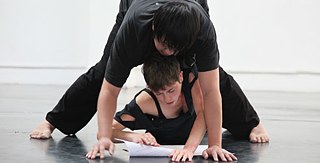Totally Happy Theatre Project
Anything but Chinese mass production

No, the Chinese don’t imitate. On the contrary, the play Totally Happy by director Tian Gebing creatively translates from one culture to the other without a mutual language, but plenty of humour. It is a Sino-German balancing act between the masses and the individual. By Sonja von Struve
“Have you ever caught yourself wanting to leave your bags at the airport unattended? Does this having something to do with an X chromosome?” Suddenly, a shot rings out, the audience at the Münchner Kammerspiele flinches, and the woman in the red dress lies motionless on grey and white balloon silk. A moment ago, the audience had closed their eyes on a dream journey from Germany to China between National Socialism and the Cultural Revolution, between the Oktoberfest and mass digitalization. Now they are all staring into the glistening spotlight. They wait, and wait, and then...nothing happens. The lift with the rest of the actors will not budge. At first, no one heard the signal to start it and now the door is jammed because someone tried to open it too soon.
“That can’t happen during the premiere,” says one of the stage technicians at the meeting following the open dress rehearsal, “maybe we need a light signal.” Some nod. Not the Chinese actors, as they are waiting for a translation. The alternating wait for comprehension does not harm the mood. A slap on the back, a smile for the child of one of the actors or a yawn after two hours of performing and one in a meeting are par for the course.

“Of course, all this translating is a grind and not very direct,” Christoph Lepschy, one of the dramaturges for Totally Happy, remembers from the play’s beginnings, “but it’s also an entirely new form of communication. You suddenly perceive what’s been said very differently and learn to observe one another more closely.”
Mutual misunderstandings
Naturally, misunderstandings cannot be avoided – nor are they meant to be. The play contains a scene about a few mangos that Mao Zedong gave a worker. It is told by a Chinese dancer and clumsily interpreted by a German actor. “That scene is absurdly funny and reveals a great deal about the losses to dialogue through translation,” says Peter Anders, head of the Goethe-Institut Beijing, “while at the same time it opens up brand new stories and levels of communication that aren’t conveyed through words, but the body.” With his staff in Beijing, Anders accompanied the genesis of Totally Happy from the first encounter between the Chinese and German ensembles to the two-week intensive workshop in the Chinese capital. “This is not simply a guest performance or guest directorship, but genuine mutual cooperation from which Totally Happy came into existence from the ground up. That’s what’s special about it,” says Anders.
“The balloon silk needs mending,” “I really need some time for the spotlights,” “We definitely want to continue to speak Chinese in the play.” Final issues are discussed, times for warmup training, dry runs and technical fine-tuning are set and Tian Gebing declares that he was very satisfied with the dress rehearsal, but doesn’t want to praise it too much because a dress rehearsal is supposed to go badly. The meeting is over and the group slowly dissolves, at least until the next day. Then they will be on stage together again and this time, even the lift will be on time for the premiere performance.
“Totally Happy” will run until 2 November at the Spielhalle of the Münchner Kammerspiele in Munich. Each performance features an introduction by the dramaturges and panel and audience discussions on three dates. All of the performances are in German and Chinese with supertitles. The exact dates can be found on the website of the Münchner Kammerspiele.